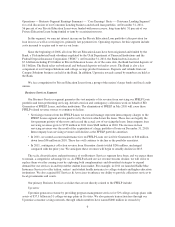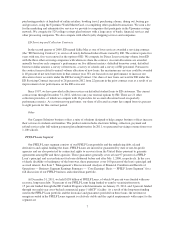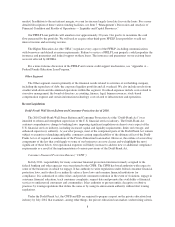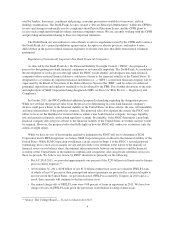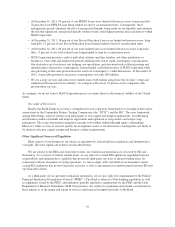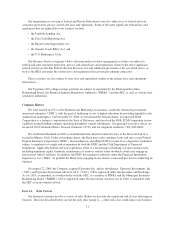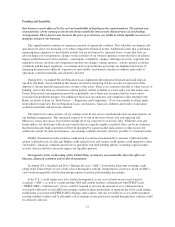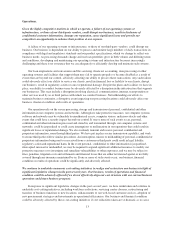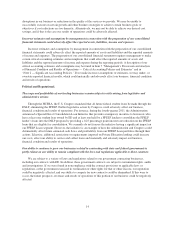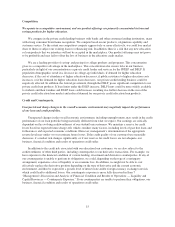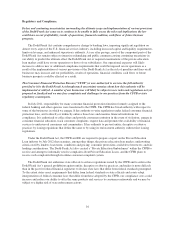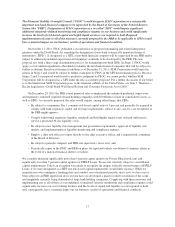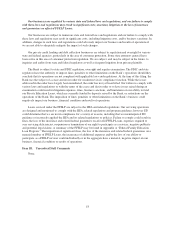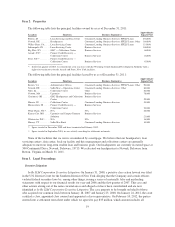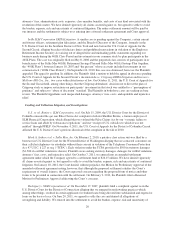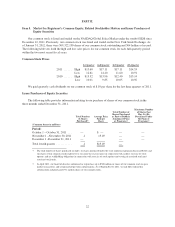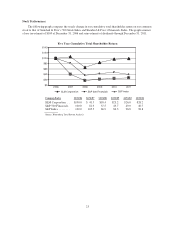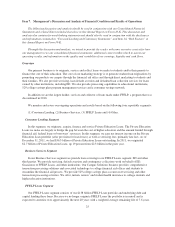Sallie Mae 2011 Annual Report Download - page 18
Download and view the complete annual report
Please find page 18 of the 2011 Sallie Mae annual report below. You can navigate through the pages in the report by either clicking on the pages listed below, or by using the keyword search tool below to find specific information within the annual report.Regulatory and Compliance.
Delays and continuing uncertainties surrounding the ultimate scope and implementation of various provisions
of the Dodd-Frank Act cause us to continue to be unable to fully assess the risks and implications the law
could have on our profitability, results of operations, financial condition, cash flows or future business
prospects.
The Dodd-Frank Act contains comprehensive change to banking laws, imposing significant regulation on
almost every aspect of the U.S. financial services industry, including increased capital and liquidity requirements,
limits on leverage, and enhanced supervisory authority. A year after passage, most of the component parts of the
Dodd-Frank Act remain subject to intensive rulemaking and public comment causing continuing uncertainty in
our ability to predict the ultimate effect the Dodd-Frank Act or required examinations of the private education
loan market could have on our operations or those of our subsidiaries. Our operational expenses will likely
increase to address new or additional compliance requirements that could be imposed on our operations as a
result of the implementation of various provisions of the Dodd-Frank Act as the risk of penalties and fines on all
businesses may increase and our profitability, results of operations, financial condition, cash flows or future
business prospects could be affected as a result.
The Consumer Financial Protection Bureau (“CFPB”) is now authorized to exercise the full authority
provided to it by the Dodd-Frank Act though much uncertainty remains about how this authority will be
implemented or utilized. A number of our businesses will likely be subject to new rules and regulations not yet
proposed or finalized and we may face complaints and challenges to our practices from the CFPB or state
regulatory counterparts.
In July 2011, responsibility for many consumer financial protection functions formerly assigned to the
federal banking and other agencies were transferred to the CFPB. The CFPB has broad authority with respect to
some of the businesses in which we engage. It has authority to write regulations under federal consumer financial
protection laws, and to directly or indirectly enforce those laws and examine financial institutions for
compliance. It is authorized to collect fines and provide consumer restitution in the event of violations, engage in
consumer financial education, track consumer complaints, request data and promote the availability of financial
services to underserved consumers and communities. It has authority to prevent unfair, deceptive or abusive
practices by issuing regulations that define the same or by using its enforcement authority without first issuing
regulations.
Under the Dodd-Frank Act, the CFPB and ED are required to prepare a report on the Private Education
Loan industry by July 2012 that examines, among other things, the private education loan market; underwriting
criteria used by lenders; loan terms, conditions and pricing; consumer protections available to borrowers; and fair
lending considerations. The Dodd-Frank Act also created a “Private Education Ombudsman” within the CFPB to
receive and attempt to informally resolve complaints about Private Education Loans, and the CFPB plans to
receive such complaints through its online consumer complaint system.
The Dodd-Frank Act authorizes state officials to enforce regulations issued by the CFPB and to enforce the
Dodd-Frank Act’s general prohibition against unfair, deceptive or abusive practices, and makes it more difficult
than in the past for federal financial regulators to declare state laws that differ from federal standards preempted.
To the extent states enact requirements that differ from federal standards or state officials and courts adopt
interpretations of federal consumer laws that differ from those adopted by the CFPB, our compliance costs could
increase and reduce our ability to offer the same products and services to consumers nationwide and we may be
subject to a higher risk of state enforcement actions.
16


